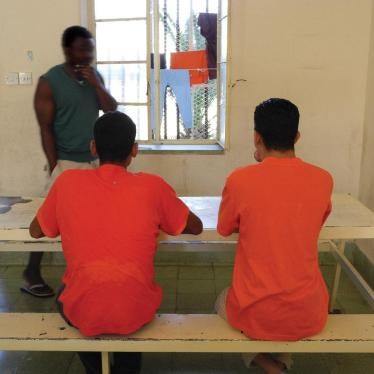The EU has done a great deal to advance democracy and human rights since Second World War, which created millions of refugees throughout Europe. Yet if it is to live up to the honour bestowed on it by the Nobel committee, the EU needs to give a much better welcome to refugees from Afghanistan, Somalia, Syria, and other conflict zones reaching Europe today. Drastic variations in reception conditions across member states, limits on programmes to re-settle people from countries hosting hundreds of thousands of refugees, and increasing hostility toward migrants and asylum-seekers mean the EU is not the sanctuary it should be.
During last year's Arab Spring, the EU did shamefully little to respond to the refugee crisis in north Africa or to prevent deaths at sea as thousands attempted dangerous crossings. Thousands of UN-registered refugees who fled Libya remain stuck in camps in Egypt and Tunisia, with offers from EU countries to take them few and far between.
The EU has yet to take concerted steps to help Syrians fleeing war, such as relaxing visa requirements or providing assistance to countries already hosting Syrians. Instead, the European Commission recently admonished Turkey – where 170,000 Syrians are staying in camps, towns, and cities – for allowing 300 Syrians to cross into Greece.
In practice, the EU's asylum policy – based on the concept of mutual trust between member states and the ideal of harmonised procedures – subjects refugees, including children, to myriad abuses. The Dublin II Regulation requires asylum-seekers to lodge their claims in the first EU country they reach, and allows for returns to that country if an asylum-seeker travels elsewhere in Europe. Not only does this arbitrarily and unfairly skew the share of refugee intake to certain EU border countries, but not all EU countries adequately assist asylum-seekers. For example, countries such as Greece, Italy and Hungary fall short of their obligations. Lengthy delays in asylum claims, poor reception conditions and integration prospects, and inadequate treatment of unaccompanied migrant children leave refugees in need. Only regional court rulings have put the brakes on these returns.
Greece, one of the major gateways into the EU, sharply limits the numbers of people who can apply for asylum every week and leaves vulnerable asylum-seekers on the streets without food or shelter. Migrants, including children, can spend months in detention centres, in conditions that the European Committee for the Prevention of Torture termed, bluntly, “unacceptable.”
At least 10,000 unaccompanied migrant children – children fleeing without their parents, typically from war zones like Afghanistan and Somalia – reach the EU each year to seek asylum.
Yet even these children fail to receive the help they need. Children who cross the Mediterranean by boat, for example, and find themselves in Malta, are detained with unrelated adults during a lengthy age-determination procedure. Children take great risks as stowaways on ferries from Greece to Italy, but Italian authorities turn them around immediately and send them back to terrible conditions in Greece.
We have documented alarming vigilante violence as well as police abuse in Greece. “I realised it is so easy to die here. We came from so far away and it is so easy to get killed here,” Ali Rahimi, an Afghan asylum-seeker, told us after he was stabbed five times in the torso by a group of thugs. Assad H., 16-year-old unaccompanied Afghan boy, showed us the scar on his arm from the time when the police set an attack dog on him. He told us: “One [of the police] twisted my hand behind my back and the other let the chain off the dog and said something to the dog, and he attacked while the other officer held me.”
The new Nobel peace prize-winner needs to look closely at its own policies for vulnerable people like Ali and Assad. The EU should radically reform Dublin II to take into account equitable burden-sharing among member countries, with genuinely common asylum standards and reception procedures. The EU should provide countries at the EU border, such as Greece, Italy, and Malta, more assistance to improve their capacity to protect and assist refugees. The EU should act on the German foreign minister's recent call for the EU to participate in a coordinated effort to host larger numbers of Syrians, and it should provide more assistance to countries already hosting tens of thousands of Syrians.
A reputation as a peacemaker carries with it an obligation to protect the victims of war. Refugees from many countries, go to great lengths to find safety in the EU. The newly honored EU should live up to that prize and provide decent sanctuary.
Judith Sunderland is a senior Europe researcher Human Rights Watch.
Alice Farmer is a children's rights researcher for Human Rights Watch.








